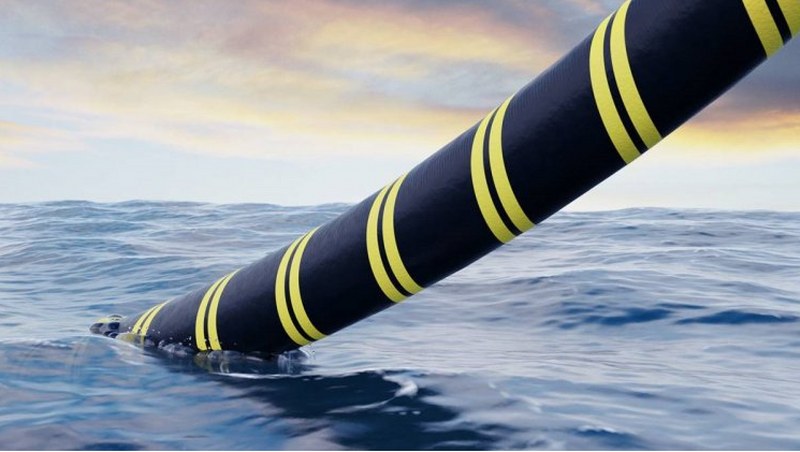 Submarine cable
Submarine cable
TRAI releases recommendations on ‘Licensing framework and regulatory mechanism for submarine cable landing in India’
New Delhi: Telecom Regulatory Authority of India (TRAI) has issued recommendations on the licensing framework and regulatory mechanism for submarine cable landing in India.
Submarine cables are crucial for global communication, connecting countries and empowering businesses.
The recommendations address concerns raised by the Department of Telecom and other issues related to submarine cables, including the need for an Indian-flagged vessel, domestic submarine cables, stub-cables, and terrestrial connectivity.
The recommendations were formulated based on inputs received from stakeholders, discussions held during an Open House Discussion, and careful analysis of the issues.
To accommodate new-generation submarine cable systems, recommendations have been made to streamline licensing and regulations for the efficient operation and expansion of submarine cable systems in India.
Two categories of Cable Landing Station (CLS) locations: Main CLS and CLS Point of Presence (CLS-PoPs). Main CLS owners will handle permissions for submarine cable landing, while CLS-PoP owners won't require separate permissions but must fulfill security and regulatory obligations.
ILD/ISP Category 'A' licensees can extend their dark fiber pairs from the main
CLS to CLS-PoP locations. CLS-PoP owners must still meet security and regulatory requirements.
Revised guidelines and applications will be issued for setting up main CLS and CLS-PoPs, providing clear procedures under respective ILD and ISP License/Authorization.
ILD or ISP Category ‘A’ authorization (with International Internet Gateway) Licensees applying for permissions to establish main Cable Landing Stations (CLS) must provide an undertaking confirming their ownership and control over assets within Indian Territorial Waters (ITW) and at the CLS location.
This undertaking should be supported by proof of ownership of the submarine cable (SMC) assets and assets at the CLS, or by a signed agreement with the SMC owner/consortium validating their ownership and control.
The Department of Telecommunications (DoT) should form a committee consisting of government representatives and major ILDOs to explore financial viability models for Indian Flagged Repair Vessels, along with potential incentives from the government.
The committee should also engage with SMC ship repair operators in the Indian Subcontinental region, urging them to relocate and reflag their vessels to Indian ports. In addition, designated Cable Depots need to be identified on both the west and east coastlines of India for the storage of submarine cables and essential equipment.
The committee should work towards facilitating the establishment of these Cable Depots, providing them with incentives similar to SEZs and land.
Furthermore, crew members involved in survey and repair work, holding valid work permits, should be exempted from the need to obtain repeated clearances during their permit period.
Under the NLD License/authorization, domestic submarine cables can connect Indian cities along the coastline with CLS. Conditions include permitting domestic traffic, allowing cables to extend beyond ITW/EEZ, ensuring equal access to CLS facilities, following TRAI regulations for access/co-location, separate network elements/equipment for domestic and international cables, maintaining physical separation for traffic termination, and routing domestic traffic through dedicated fiber pairs within India.
The ILD and NLD licenses should explicitly state that terrestrial connectivity between different CLSs is permitted.
The ILD license should clarify that transit international traffic not meant for termination in India can be transited to other submarine cables through terrestrial and submarine cable links. ILD/ISP Category 'A' licensees may be allowed, with prior permission from the licensor, to lay stub-cables (pre-laid dark fiber SMC) and terminate them in existing CLS or establish new CLS for such stub-cables.
Conditions include disclosing details of used and unused dark fiber pairs annually, seeking approval for using/sharing these fibers, providing access on a fair and non-discriminatory basis, and allowing transfer of stub ownership with prior permission from the licensor.
The CLS and submarine cables operation and maintenance services should be accorded 'Essential Services' status.
Additionally, they should be notified as Critical Information Infrastructure (CII) under the National Critical Information Infrastructure Protection Centre (NCIIPC). Customs duty and GST exemptions should be granted for goods and items required for CLS, and submarine operation and maintenance.
The requirement of a bond for availing customs duty exemptions by cable ship repair vessels should be eliminated. Clearances related to Environmental Impact Assessment (EIA) and Coastal Region Zone (CRZ) should be made available online through the Saral Sanchar portal. Instead of mandatory presence, the collection of survey data should be supervised by the Ministry of Defence (MoD) in collaboration with Indian representatives and responsible licensee officials.
To promote and protect the importance of cable landing stations and submarine cables in India, a section should be included in the Indian Telecommunication Bill, 2022.
Support Our Journalism
We cannot do without you.. your contribution supports unbiased journalism
IBNS is not driven by any ism- not wokeism, not racism, not skewed secularism, not hyper right-wing or left liberal ideals, nor by any hardline religious beliefs or hyper nationalism. We want to serve you good old objective news, as they are. We do not judge or preach. We let people decide for themselves. We only try to present factual and well-sourced news.







